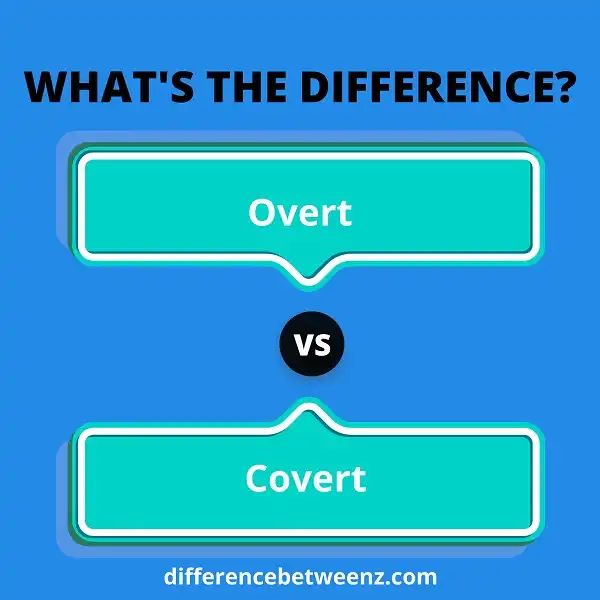What is the difference between Overt and Covert? How can you tell which one someone is using? These are two important concepts when it comes to communication, and it’s important to understand the difference. In this blog post, we’ll take a look at both overt and covert communication, and discuss how to use them effectively. We’ll also explore some of the benefits of each approach. So, let’s get started!
What is Overt?
Overt refers to something that is done openly or publicly. It can also refer to something that is done without attempting to conceal it. Overt behavior is the opposite of covert behavior, which involves hiding one’s actions or intentions. Overt behavior can be positive or negative. For example, someone who is overt about their feelings of love or anger is likely to express them openly and honestly. In contrast, someone who is covert about their feelings is more likely to hide them from others. Overt behavior can also be a form of communication. For example, someone may use overt body language to communicate their interest in another person. Overt behavior is usually more effective than covert behavior in terms of communication because it allows others to see and interpret our actions more easily.
What is Covert?
Covert behavior is any action or communication that is conducted in secret. It is typically used to achieve some goal that would be difficult or impossible to achieve through overt behavior. Covert behavior can take many different forms, but some common examples include espionage, sabotage, and subterfuge. Covert behavior is often viewed as unscrupulous or even criminal, but it can also be used for more mundane purposes, such as keeping a surprise party a secret. In general, the decision to engage in covert behavior is dictated by the perceived risks and benefits of the behavior in question. Covert behavior carries with it a certain amount of risk, but it can also offer a significant advantage over overt behavior in certain situations.
Difference between Overt and Covert
Overt and covert behavior refers to how unmistakable or noticeable an action is. Overt behavior is explicit, intentional, and apparent, while covert behavior is implicit, subtle, and hidden. The difference between the two can be best seen in the context of a simple example. If someone intentionally falls to the ground and cries out in pain, their behavior is overt; there is no mistaking their intention. On the other hand, if someone were to wince in pain and subtly rub their arm, their behavior would be considered covert; it is not immediately apparent that they are in pain. While overt behavior is generally more obvious, covert behavior can often be more effective because it is less likely to be noticed or interpreted as a threat.
Conclusion
Overt and covert behaviors are both essential for effective communication. Understanding the difference between the two will help you to better understand how people communicate with each other. When you can identify someone’s overt behavior, you can adjust your own communication style to be more effective. And when you recognize someone’s covert signals, you can respond in a way that supports them and helps them feel comfortable communicating with you.


